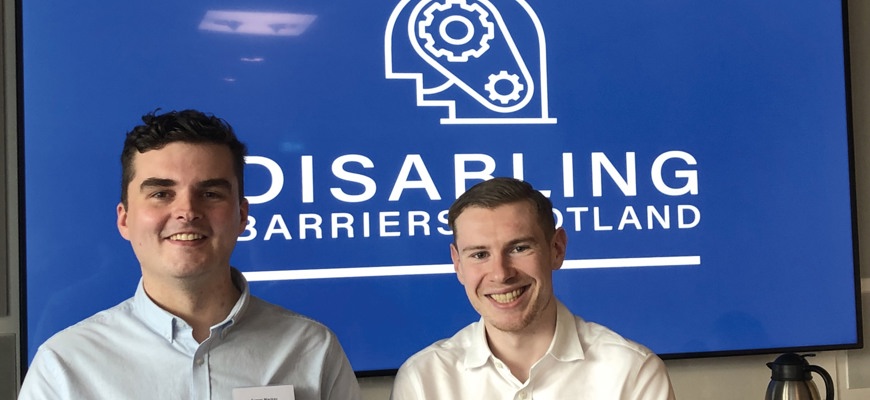Can we take down the barriers?

Disabling Barriers Scotland has held its first in-person event, as it explores the next steps to take the organisation forward.
Founded by Fraser Mackay, trainee solicitor at the Scottish Social Services Council, and Tom McGovern, trainee at McGovern Reid solicitors, the group aims to focus on the barriers that prevent someone from accessing and sustaining a career in the legal profession – including but not necessarily limited to all forms of personal disability.
As Rob Marrs, the Law Society of Scotland’s Director of Education, observed, there is a richness of groups supporting those who might be disadvantaged in seeking a career in law, but this is the first that seeks to represent disabled people.
The launch event heard from a succession of speakers on the application of an inclusive approach at different stages of a career, and how talent can reside in any sector of the population.
Meeting at Morton Fraser MacRoberts’ office at Quartermile, Edinburgh, the audience heard the talent message from Martin Glover, the firm’s HR director. He described how the firm’s recruitment practice and selection criteria had changed over his time there to adopt the RARE system, which identifies traineeship applicants who have outperformed in relation to their background, many offers now also going to applicants who are neurodiverse.
Survey findings
Marrs noted that the Society’s recent Profile of the Profession survey found that 28% of respondents claimed to have some form of impairment or condition – which might cover matters such as long Covid, menopause effects or neurological conditions – and for the first time had asked this question ahead of whether they considered they had a disability, which received a 5% yes response, similar to the 5% in 2018 and 4% in 2013.
That there is still a reluctance to disclose a condition, for fear of stigma or rejection, or to ask for reasonable adjustments, was borne out by Alan Sinclair of Addleshaw Goddard, now one of Disabling Barriers’ team, who concealed his dyslexia until last year when his firm’s diversity agenda encouraged him to go public; his article in The Herald had met with a “fantastic reaction”.
Marrs told us that he hears a constant response that things are getting better but we are not there yet. “Anyone who works in diversity and inclusion should want to be out of a job”, he remarked. The biggest single thing we can all do is to become more inclusive in our mindset, so that people don’t even have to request reasonable adjustments – he hoped more able bodied and neurotypical people would attend events like this.
Lindsay Jack, director of Student Experience at Edinburgh Law School, described the extremely broad reach of the school’s disability and learning support service, with more than 150 different adjustments students can request. “What about the organisations they go on to work for?” she asked. “Do applicants have to mask their needs just to get in? Or once they are in?” She urged us not to talk about organisational fit, but whether our organisation fits those with lived experience.
Next steps
In addition to seeking charitable status, Disabling Barriers’ ambitions are “to create partnerships with legal firms to help us take our next steps as an organisation”, Fraser Mackay told the Journal. “We are working on having a website where we can expand our student membership, offer anonymous Q&A advice, post direct opportunities from legal firms and survey our members to ensure that their views are represented.
“We have and will continue to host regular insight events, discussions with employers, and partnerships with disabled people organisations. We are a growing community, the first of its kind in Scotland, to represent and advocate for the views of disabled solicitors.
“The Profile of the Profession Survey 2023 demonstrated that the proportion of solicitors identifying as having a disability has only increased 1% since 2013. This demonstrates a significant disability employment gap in our sector which we at Disabling Barriers are confident we can help to increase, but we need the backing of the profession to do so.”
Regulars
Perspectives
Features
Briefings
- Criminal court: Boundaries of corroboration
- Corporate: Deceptive digital design – no clever cookie?
- Agriculture: Ending LDTs in a second short continuation
- Succession: Attorney as executor?
- Sport: Is that in the rules?
- Scottish Solicitors' Discipline Tribunal: December 2023
- In-house: The real deal
- Intellectual property: Making your mark with a sound






